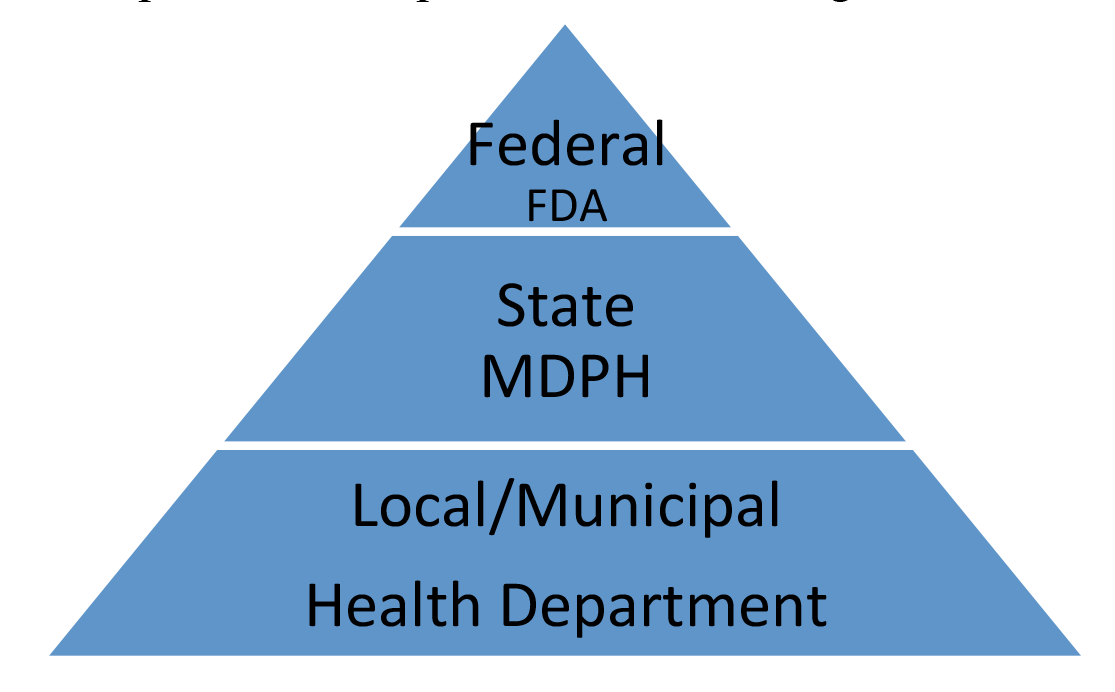Business Plan - Business Classification
The legal and administrative organization of your business is key to its success –- how is it managed, what regulations apply? To support drafting this portion of your business plan, it will be advantageous to consult a lawyer early on. To familiarize yourself with the health department classifications continue reading.
The degree of connection your business has with the end consumer influences what local, state, or federal licensure you may have to apply for and which levels of the Health Department (Local, State, or Federal) will inspect your production facility.
License names vary by town. Check with your town to determine which town license may be required.
| Wholesale Food Business | Retail Food Business |
|---|---|
|
|
Adapted from the MDPH FPP: Starting a Wholesale Food Business
Wholesale Food Business
In the state of Massachusetts, a wholesale food business is one which sells food products, but not directly to the consumer. This applies to businesses that might sell to a specialty food store or boutique. As such, a wholesale food business must have a license to operate from the Department of Public Health’s Food Protection Program.
Your business will be considered wholesale and will need to apply for a Wholesale Food Business license if any of the following apply:
- You operate out of a residential kitchen, but do not sell directly to consumer (A Wholesale Residential Kitchen)
- You process food in any way
- You contract with a co-packer (your business is considered a distributor)
- Milk Pasteurization
- Dairy Products
- Seafood (including transport)
- Food Warehouses
- Food Distribution Centers
- Bottled Water
- Carbonated Beverages
The application for a Wholesale Food Business can be found on the Massachusetts Department of Health page. One license per business, per place of production. There is a $300 dollar licensing fee to register each facility.
Activities requiring a wholesale license include:
- Food Packing and Repacking
- Wholesale Residential Kitchen
- Distribution at Wholesale
- Cold Storage
Retail Food Business
If you will be selling directly to the consumer, your business is classified as a Retail Food Business. This may be the case if you are selling at a farmers' market, or you rent a booth inside a specialty food store. You will be licensed as a Retail Food Establishment by a local or municipal Health Department. General regulations can be found on MDPH Retail Food Page.
 Example:
Example:
Paula’s Pasta makes dry pasta sold to culinary boutiques across the state. The business operates out of a commercial kitchen. Because this business does not sell directly to the consumer, Paula’s is considered wholesale. As such, the business and facility must be registered and licensed by
- The State as a Wholesale Food Business. With this designation it will be subject to inspection by the state Food Protection Program (FPP) before and during production. However, the business and facility must also be registered with
- The local health department as a food establishment specifying that it is a Wholesale Food Business.
The facility will be inspected by the local health department on a more frequent basis than by the FPP. If Paula’s Pasta begins to sell over state lines or over the internet, the business must then register with the FDA as a food facility, at which point there will also be periodical FDA inspections.
Obtain both licenses so that you can diversify where you can sell your product. If your business sells both directly and indirectly to the consumer -- for example, the product is sold to specialty food stores but also at a farmers' market booth -- you will need to apply for both classifications of license, but you can sell to a wider audience. From there you can determine which market is more profitable.